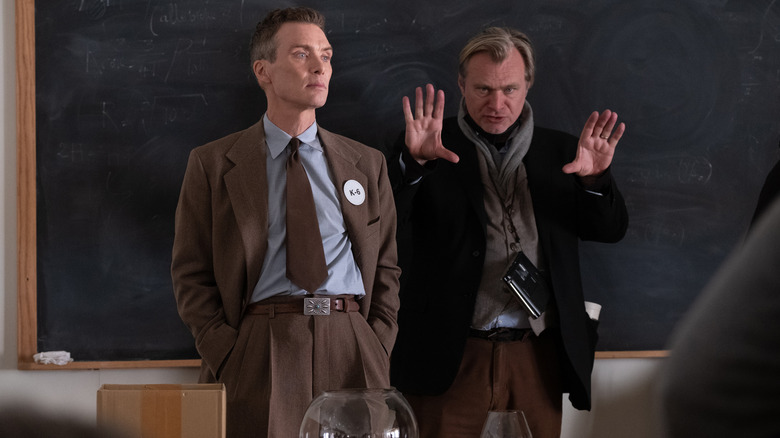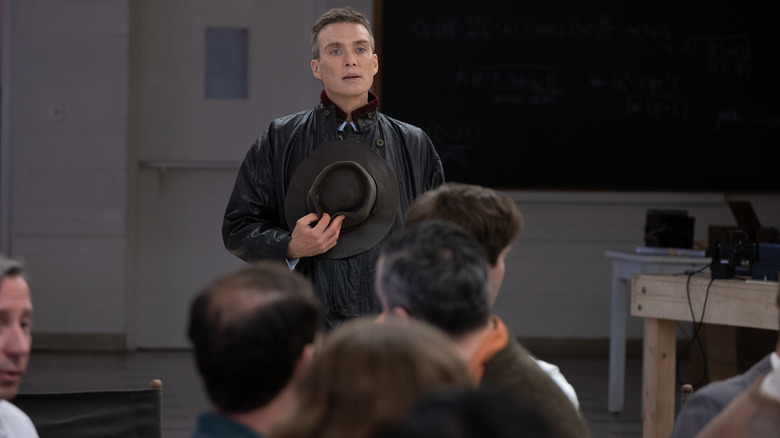No, You Dummies, Oppenheimer Isn't A Pro-Nuclear Bomb Movie
This article discusses spoilers for "Oppenheimer."
Welcome to being a movie fan in the 21st Century, folks. It's not a new phenomenon for the weeks and months leading up to a major blockbuster to be filled with all sorts of hot takes and rampant speculation, but never have we been subjected to that through constant, unfiltered social media reactions. Sometimes, it takes the form of really fun and organic viral sensations (happy #Barbenheimer, one and all!) but, other times, you find yourself staring at a series of ill-informed and wildly off-base tweets making up the wildest claims about a movie — a movie which many of those opinionated individuals haven't even seen yet. "Oppenheimer," for better and worse, has been subject to both extreme ends of the spectrum.
That's not exactly a new development for Christopher Nolan, a director who has inadvertently attracted the most vocal movie fans out there. You'd be hard-pressed to find anyone without strong opinions on his "The Dark Knight" trilogy, but even his various original and non-IP films have given audiences a roadmap to tap into his biggest interests, fears, and fixations. That means the inevitable passage of time, recurring portrayals of dead wives/girlfriends, and the fact that the vast majority of his movies embody a very white perspective and worldview.
This is all present and accounted for in "Oppenheimer," admittedly, but a new wrinkle has been added to the mix. Ahead of Nolan's most overtly political film yet, certain segments of moviegoers have sounded the alarm bells and embraced a narrative that his interpretation of the life of J. Robert Oppenheimer, "Father of the Atomic Bomb," might somehow justify the horrific killings of hundreds of thousands of innocents. Thankfully, those unfounded fears were never even a remote possibility in the first place.
'The power to destroy ourselves'
Somebody once wrote a line of dialogue about how "You either die a hero or live long enough to see yourself become the villain," put it in their breakout superhero movie, and all but predicted how bad-faith detractors would attempt to take him down a peg for years to come. Was Chris Nolan a self-fulfilling prophet? A student of history? Or was he just someone with the common sense to look around him and recognize what was what?
If the past really is our best signifier of the future, then it feels truly misguided to look at the filmmaker's past body of work and jump to conclusions that "Oppenheimer" would take the most didactic approach of them all. Not that anyone as privileged as Nolan needs us to circle the wagons on his behalf, but he's clearly made a career out of taking the moral quandaries inherent within complex, oftentimes contradictory characters and testing these to their breaking point in the most extreme of circumstances. After all, that's how we end up with movies about Bruce Wayne becoming an outlaw to save Gotham City, a pair of dueling magicians losing themselves in their obsessions, and a profoundly broken, guilt-ridden man committing an illegal mind heist to be reunited with his kids. Even "Dunkirk," arguably the most straightforward tale of heroism in Nolan's filmography, ends not on the stirring image of a captured British warplane essentially burning in effigy, but a disconcerting close-up on the soldier who only just barely survived this ordeal realizing he'll soon be shipped out to face even greater dangers to come.
Does any of this suggest a storyteller who'd strip the horror out of the most horrific act in human warfare ... or, instead, interpret it as yet another cautionary tale?
'American Prometheus'
For the moment, forget the fact that "American Prometheus: The Triumph and Tragedy of J. Robert Oppenheimer," the imposing biography written by Kai Bird and Martin J. Sherwin that "Oppenheimer" is based on, refuses to pull any punches about the complicated legacy of its subject matter. Set aside the reams of documented, historical evidence that the United States' pretext for dropping the bombs on Japan was considered flimsy, even at the time. No, there's an even simpler explanation as to why "Oppenheimer" never even entertained the notion of being a "pro-nuclear bomb" movie: Where would any of the conflict or drama be in that?
There's a reason why the film begins with the haunting quote about the Greek god Prometheus stealing the fire of the gods and gifting it to us mere mortals ... only to be subsequently punished for eternity. Naturally, we then open on a young Oppenheimer already feeling tortured by visions of the quantum universe that only he can see — visions that, disturbingly, resemble violent nuclear explosions. Human nature, the film is practically screaming at its audience right from its earliest moments, will always trend towards self-destruction. Not only is this the quintessential archetype of a Nolan protagonist, but it's also the only dramatic interpretation of Oppenheimer's life that would merit devoting three whole hours to diving into his psychology.
There's a hypothetical, made-up version of "Oppenheimer" that would've actually lined up with the one concocted in the minds of the skeptics — one that's nothing but flag-waving jingoism (probably made by the same folks behind "Sound of Freedom") about how great America is at winning wars and proving doubters wrong. But the much richer text we received instead dares to confront horrible truths about our worst instincts. Because why else make this movie?
'Theory will take you only so far'
A little more than halfway through "Oppenheimer," after reports of Hitler's self-inflicted death and the fall of Nazi Germany come trickling in, the script goes out of its way to literalize the main conceit of the film. After Oppenheimer crashes a meeting of colleagues to discuss the effects of their "gadget" on the wider world, Nolan stages an actual debate about the ethics of dropping the atomic bombs on Japan. Informed that Japan's defeat seems "imminent" and that using their invention would inflict untold harm upon the world, Oppenheimer counters that world leaders can only "fear" and "understand" the weapon if they use it. When he offers up his pie-in-the-sky belief that all war will be unthinkable in a post-nuclear bomb world, the tepid applause his speech inspires only underlines his naïveté and denial.
Ever wonder how "Oppy" could convince himself to continue his work while compartmentalizing the devastating effects it would inevitably have on innocents caught in the blast? So does physicist Niels Bohr (Kenneth Branagh), who bestows the "American Prometheus" title on Oppenheimer and calls for international nuclear disarmament. So does the security council, when Roger Robb (Jason Clarke) calls out Oppenheimer's hypocrisy over when exactly he first began to develop "moral qualms" about his work.
There are approximately dozens of examples like this throughout the mammoth runtime, where "Oppenheimer" doesn't really tip its hand so much as it slaps us in the face with the cold reality of the entire Manhattan Project. Theory will only take you so far, Oppenheimer's friend Ernest Lawrence (Josh Hartnett) puts it early on. If only those who assumed this adaptation would be "pro-nuke" followed that advice, set their prejudgment aside, and just ... watched the movie.
"Oppenheimer" is currently playing in theaters.



